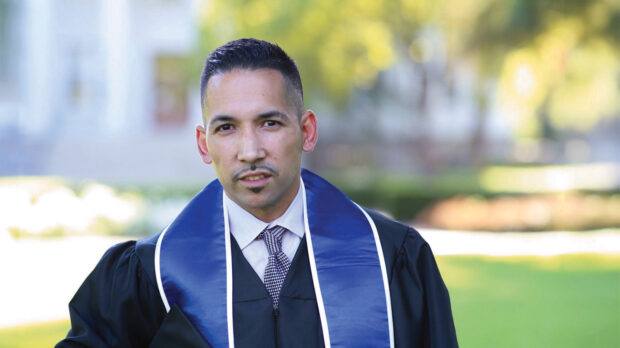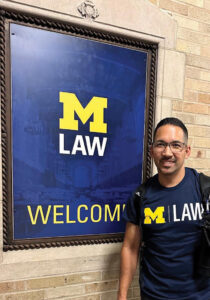
Ruben Piñuelas ’21
All Ruben Piñuelas ’21 wanted was a level playing field.
After being incarcerated for nearly 15 years—six of those wrongfully so—Piñuelas knew changing the trajectory of his life in his 40s would require overcoming biases society can put on people with such baggage.
“Pomona believed in me on day one,” he says, “and ushered me into this world of higher education.”

Ruben Piñuelas ’21
After running from the law as a young adult, Piñuelas now is a second-year law student at the University of Michigan who returned to Claremont to speak at the Athenaeum at Claremont McKenna.
“At one time society threw me away [and] told me I’ll never be good enough to be a scholar,” he says. “What I came back from—I’ve accomplished the impossible.”
Piñuelas started running with a gang in El Centro, California, in high school. In 1999, the then-20-year-old was sentenced to two years in prison for marijuana possession and erroneously placed with inmates serving life terms. He was later charged in connection with a prison riot—he says he was only defending himself in the fight, and was tricked into taking a deal to add seven years to his term.
In 2008, Piñuelas raised enough money to make bail on new conspiracy charges he was facing. While on parole, he helped local groups build houses and enrolled in night community college classes at Pierce College in Los Angeles.
Piñuelas was taken back into custody in 2010 for alleged parole violations and his alleged involvement in a 2007 prison incident involving people he says he never met. In 2011 he was convicted of conspiracy to murder, attempted murder and assault with a deadly weapon on an inmate. He was given 60 years to life and sent to solitary confinement in a maximum-security prison in Crescent City.
While in solitary, Piñuelas began studying law, and advocated for his innocence. In 2013 a panel of California appellate justices overturned his conviction based on insufficient evidence. After his 2014 release he returned to Pierce to earn two associate degrees, qualifying for financial assistance to continue his studies at Pomona.
“Sixty [years] to life, 12 years in solitary, no one comes back from that,” Piñuelas says. “I was in a dark place, but I learned it’s not what’s been done to you, but what you do with it.”
Community college students comprise about two-thirds of Pomona’s yearly transfer cohort, and while most of that group comes from California, the Office of Admissions has bolstered outreach efforts nationwide. Admissions officers attend off-campus events, host open houses and connect with local community colleges for special campus tours and financial aid workshops.
Susanne Mahoney Filback, associate director of preprofessional programs and prelaw advisor at the Career Development Office (CDO), recalls Piñuelas emailing her the summer before his first semester at Pomona about his plan to pursue law. To get accustomed to Pomona he regularly met with her and showed up at CDO law events.
“He knew he wanted to make a difference and that was directly related to what he went through,” Filback says. “He had a thoughtful understanding of why he was here and how he was going to make the most of Pomona’s resources.”
As someone who felt life would always be an uphill battle, Piñuelas was blown away by how reassuring his professors were when he questioned whether he belonged at Pomona. “They always believed in me,” he says. “They gave me everything I needed to thrive, perform and be the student I needed to be.”
As a psychological science major, Piñuelas especially admired Eric Hurley, professor of psychological science and Africana studies. “It was refreshing to hear from someone I could identify with as a student of color,” he says. Piñuelas took Hurley’s Psychology of the Black Experience course and later became a course mentor in his Intro to Psychology class.
After graduating, Piñuelas continued his studies at the University of Michigan, with aspirations of becoming a trial attorney, a civil rights lawyer and California Supreme Court justice.
“I’m trying to maximize the time I have left,” he says. “A lot of time was stolen from me, but I don’t want to mope. I want to use it as a blessing, an opportunity for others to learn about what I’ve been able to gain from my experience, and to use it to better the world.”
